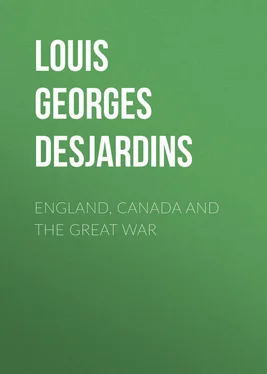Louis Desjardins - England, Canada and the Great War
Здесь есть возможность читать онлайн «Louis Desjardins - England, Canada and the Great War» — ознакомительный отрывок электронной книги совершенно бесплатно, а после прочтения отрывка купить полную версию. В некоторых случаях можно слушать аудио, скачать через торрент в формате fb2 и присутствует краткое содержание. Жанр: foreign_antique, foreign_prose, на английском языке. Описание произведения, (предисловие) а так же отзывы посетителей доступны на портале библиотеки ЛибКат.
- Название:England, Canada and the Great War
- Автор:
- Жанр:
- Год:неизвестен
- ISBN:нет данных
- Рейтинг книги:5 / 5. Голосов: 1
-
Избранное:Добавить в избранное
- Отзывы:
-
Ваша оценка:
- 100
- 1
- 2
- 3
- 4
- 5
England, Canada and the Great War: краткое содержание, описание и аннотация
Предлагаем к чтению аннотацию, описание, краткое содержание или предисловие (зависит от того, что написал сам автор книги «England, Canada and the Great War»). Если вы не нашли необходимую информацию о книге — напишите в комментариях, мы постараемся отыскать её.
England, Canada and the Great War — читать онлайн ознакомительный отрывок
Ниже представлен текст книги, разбитый по страницам. Система сохранения места последней прочитанной страницы, позволяет с удобством читать онлайн бесплатно книгу «England, Canada and the Great War», без необходимости каждый раз заново искать на чём Вы остановились. Поставьте закладку, и сможете в любой момент перейти на страницу, на которой закончили чтение.
Интервал:
Закладка:
And I will say this: if the peace of Europe can be preserved, and the present crisis safely passed, my own endeavour will be to promote some arrangement to which Germany will be a party, by which she could be assured that no aggressive or hostile policy would be pursued against her or her allies by France, Russia, and ourselves, jointly or separately. I have desired this and worked for it, as far as I could, through the last Balkan crisis, and, Germany having a corresponding object, our relations sensibly improved. The idea has hitherto been too Utopian to form the subject of definite proposals, but if this present crisis, so much more acute than any that Europe has gone through for generations, be safely passed, I am hopeful that the relief and reaction which will follow may make possible some more definite rapprochement between the Powers than has been possible hitherto.
The British Government could not take a more dignified stand and express their indignation at the infamous proposal in stronger and more noble terms.
Let us now read the indignant protest of Mr. Asquith, the British Prime Minister, against the outrageous German proposition, addressed to the House of Commons, where it raised a storm of applause, proclaiming to the World the dogged determination of England to wage war rather than agree to the dishonourable German proposal: —
What does that amount to? Let me just ask the House. I do so, not with the object of inflaming passion, certainly not with the object of exciting feeling against Germany, but I do so to vindicate and make clear the position of the British Government in this matter. What did that proposal amount to? In the first place, it meant this: That behind the back of France – they were not made a party to these communications – we should have given, if we had assented to that, a free license to Germany to annex, in the event of a successful war, the whole of the extra European dominions and possessions of France. What did it mean as regards Belgium? When she addressed, as she has addressed in the last few days, her moving appeal to us to fulfil our solemn guarantee of her neutrality, what reply should we have given? What reply should we have given to that Belgian appeal? We should have been obliged to say that without her knowledge we had bartered away to the Power threatening her our obligation to keep our plighted word. The House has read, and the country has read, of course, in the last few hours, the most pathetic appeal addressed by the King of Belgium, and I do not envy the man who can read that appeal with an unmoved heart. Belgians are fighting and losing their lives. What would have been the position of Great Britain to-day in the face of that spectacle if we had assented to this infamous proposal? Yes, and what are we to get in return for the betrayal of our friends and the dishonour of our obligations? What are we to get in return? A promise – nothing more; a promise as to what Germany would do in certain eventualities; a promise, be it observed – I am sorry to say it, but it must be put upon record – given by a Power which was at that very moment announcing its intention to violate its own treaty, and inviting us to do the same. I can only say, if we had dallied or temporized, we, as a Government, should have covered ourselves with dishonour, and we should have betrayed the interests of this country, of which we are trustees.
After quoting and eulogizing the telegraphic despatch of Sir Edward Grey to Sir E. Goschen, dated July 30, 1914, Mr. Asquith proceeded as follows: —
That document, in my opinion, states clearly, in temperate and convincing language, the attitude of this Government. Can any one who reads it fail to appreciate the tone of obvious sincerity and earnestness which underlies it; can any one honestly doubt that the Government of this country in spite of great provocation – and I regard the proposals made to us as proposals which we might have thrown aside without consideration and almost without answer – can any one doubt that in spite of great provocation the right hon. gentleman, who had already earned the title – and no one ever more deserved it – of Peace Maker of Europe, persisted to the very last moment of the last hour in that beneficent but unhappily frustrated purpose. I am entitled to say, and I do so on behalf of this country – I speak not for a party, I speak for the country as a whole – that we made every effort any Government could possibly make for peace. But this war has been forced upon us. What is it we are fighting for? Every one knows, and no one knows better than the Government the terrible incalculable suffering, economic, social, personal and political, which war, and especially a war between the Great Powers of the world must entail. There is no man amongst us sitting upon this bench in these trying days – more trying perhaps than any body of statesmen for a hundred years have had to pass through, there is not a man amongst us who has not, during the whole of that time, had clearly before his vision the almost unequalled suffering which war, even in just cause, must bring about, not only to the peoples who are for the moment living in this country and in the other countries of the world, but to posterity and to the whole prospects of European civilization. Every step we took with that vision before our eyes, and with a sense of responsibility which it is impossible to describe. Unhappily, if in spite of all our efforts to keep the peace, and with that full and overpowering consciousness of the result, if the issue be decided in favour of war, we have, nevertheless, thought it to be the duty as well as the interest of this country to go to war, the House may be well assured it was because we believe, and I am certain the Country will believe, we are unsheathing our sword in a just cause.
If I am asked what we are fighting for I reply in two sentences. In the first place to fulfil a solemn international obligation, an obligation which, if it had been entered into between private persons in the ordinary concerns of life, would have been regarded as an obligation not only of law but of honour, which no self-respecting man could possibly have repudiated. I say, secondly, we are fighting to vindicate the principle which, in these days when force, material force, sometimes seems to be the dominant influence and factor in the development of mankind, we are fighting to vindicate the principle that small nationalities are not to be crushed, in defiance of international good faith, by the military will of a strong and overmastering Power. I do not believe any nation ever entered into a great controversy – and this is one of the greatest history will ever know – with a clearer conscience and stronger conviction that it is fighting, not for aggression, not for the maintenance even of its own selfish interest, but that it is fighting in defence of principles, the maintenance of which is vital to the civilisation of the world. With a full conviction, not only of the wisdom and justice, but of the obligations which lay upon us to challenge this great issue, we are entering into the struggle.
The German Government refusing to order their army to retire from the Belgian territory it had violated, at midnight, 4th to 5th August, 1914, the whole British Empire was at war with the whole German Empire.
Surely, there is not the slightest necessity to argue any more that in the terrific war raging for the last four years, Justice and Right are on the side of England and her Allies. No war was ever more just, waged with equal honour for the triumph of Liberty and Civilization, for the protection of Humanity against the onslaught of barbarism developed to the cruelty of the darkest ages of History.
CHAPTER III.
The Call To Duty In Canada
Every one knows how the news of the State of War between the British and German Empires were received in our great Canadian Dominion, after the days of anxious waiting which culminated in the rallying of England to the defence of the cause of Freedom and Civilization. When the call for duty was sounded in the Capital of the British Empire, it rolled over the mighty Atlantic, spreading over the length and breadth of Canada, being re-echoed with force in our Province of Quebec.
Читать дальшеИнтервал:
Закладка:
Похожие книги на «England, Canada and the Great War»
Представляем Вашему вниманию похожие книги на «England, Canada and the Great War» списком для выбора. Мы отобрали схожую по названию и смыслу литературу в надежде предоставить читателям больше вариантов отыскать новые, интересные, ещё непрочитанные произведения.
Обсуждение, отзывы о книге «England, Canada and the Great War» и просто собственные мнения читателей. Оставьте ваши комментарии, напишите, что Вы думаете о произведении, его смысле или главных героях. Укажите что конкретно понравилось, а что нет, и почему Вы так считаете.












